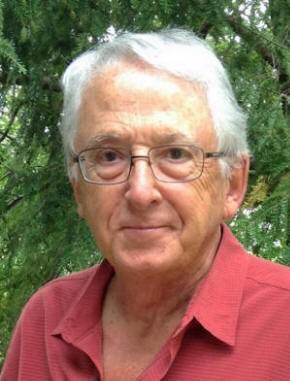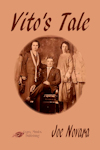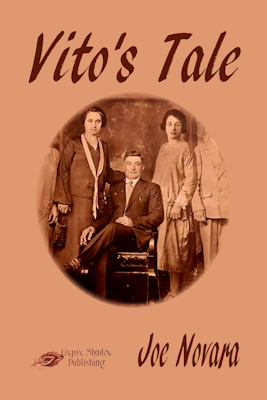Joe Novara

|
Retired corporate trainer and writing instructor, Joe Novara and his wife live in Kalamazoo, Michigan. Writings include novels, short stories, poems, anthologies and articles. Seven of his young adult novels are accessible through http://www.storyshares.org/users/view He also maintains a web/blog titled, Writing for Homeschooled Boys http://joenovara.wordpress.com. His latest novel, Come Saturday…Come Sunday, (Cawing Crow Press, 2016) is available through Amazon.
Reviews: Just some author friends…
WEBSITE: http://joenovara.wordpress.com
BLOG: https://freefloatingstories.wordpress.com/
FACEBOOK: https://www.facebook.com/joe.novara
|
New Title(s) from Joe Novara





Order the Piñata Belly and Other
Tales of Later Love Print Book today!
Click on the thumbnail(s) above to learn more about the book(s) listed.
 |
I’m Here is a coming-of-old-age novel about three unattached men
and the women who come to grace their lives. Tre, a retired
creative writing professor, takes up residence in a senior
community so his injured hip can heal without the challenges of
his three-story house. Marjorie, his former non-traditional
student, invites Tre to join her resident writing group and
eventually a fuller relationship. A childhood buddy, Sal, is in
the community as well, but unhappily so. When Sal finds a way to
escape institutional living, Bernice, a long-time neighbor and
friend welcomes him into her home and life. Vinnie, soft-spoken
carpenter, life-long bachelor, happens upon Tre’s ex-wife and
the startling joys of relationship. What do the women in this
silver romance see in these men…can they count on them to be
there for them?
Excerpt
Word Count: 40000
Buy at:
Smashwords (all formats) ~
Barnes and Noble ~
Amazon
Price: $ 3.99
|
|
|
 |
After 25,000 Masses is a sequel to I'm Here, published by GSP in
October of 2018, and is the story of a retired priest who sets
out to free himself from the constraints and bonds of his
lifelong vocation. Fr. McRae decides that he has done a good job
of being a priest and can now, in good conscience, step away
from the calling and all of its demands. Open to new
possibilities, he goes on an Elder Tour where one of his fellow
travelers turns out to be a woman who knew him as the school
chaplain when she was a senior in high school. It takes Bernice
a while to recognize Fr. Tim and, given her boredom at being the
only unattached woman on the tour, takes her time teasing him
into acknowledging his former life which in turn means admitting
to her girlish ‘crush’ on him. The story soon moves beyond their
improbable early connection to the exhilarating possibilities of
elder love.
Excerpt
Word Count: 20000
Buy at:
Smashwords (all formats) ~
Barnes and Noble ~
Amazon
Price: $3.99 |
|
|
 |
Harry, a retired African American high school history
teacher turned D.C. tour guide, decides to explore guiding
opportunities in Guatemala. On an outing to Mayan ruins, the
life-long bachelor with a rapport with teens, connects with
Bryn and through her, with her ex-pat grandmother, Cobi.
Surprised by love, so late in life, in a cultural setting
that views him as a “darker wave in a sea of brown,” he
links up with Cobi as she unravels her tangled, exiled,
Southern past.
Excerpt
Word Count: 22164
Buy at:
Smashwords (all formats) ~
Barnes and Noble ~
Amazon
Price: $3.99
|
 |
ORDER
Piñata Belly and other Tales of Later Love IN PRINT TODAY! (ISBN:
978-1-61950-650-3) |
|
|
 |
Vito’s Tale is a piece of creative non-fiction (or
historical fiction) about my grandfather who came to this
country from Sicily ahead of his wife and children, sent my
father to college, worked heavy construction labor all the
while longing to return to the ‘home’ he left behind.
Finally, as a widower, he did go back, married again and
welcomed the grandson who came full cycle to live with him
for a summer.
Excerpt
Word Count: 19200
Buy at:
Smashwords (all formats) ~
Barnes and Noble ~
Amazon
Price: $3.99 |
|
|
 |
Nick Finazzo, a roving freelance writer, spots Carol walking
a Lake Michigan beach a long way and a lifetime from their
early years in Detroit’s Eastside—their adolescent
attraction, friends in common and now disparate life
styles—her Lake Michigan mansion, his live-in van. Can they
start over?
Excerpt
Word Count: 5700
Buy at:
Smashwords (all formats) ~
Barnes and Noble ~
Amazon
Price: FREE at Smashwords or $.99 elsewhere |
|
|
|
|
| Excerpts |
I'm Here
|
Tre
Sal’s lip quivers as he chews his vegetable soup, like he might
be ready to cry. He stabs at his mouth with his embossed napkin
trying to staunch the overrun. “Purging,” he mumbles at the risk
of dribbling more soup. “My daughter and son-in-law want to
throw out all my stuff. They kept telling me to purge. To
basically dump my whole life on the curb.”
Funny thing. We grew up in the same neighborhood. Lived across
the street from each other for years and now we’re stuck in the
same retirement home in a maze of endless, carpeted corridors
with varnished handrails leading to elevator coves and the
occasional outside door. As if we could get very far even if we
left. It’s a prison basically. And they call it Shelden Ponds.
Turns out, Sal got sentenced because he took too much time
trying to decide what to keep and what to throw out. So, by now
they probably got a dumpster on the front lawn and are shoveling
out his place, so they can sell it and pay for him to live in
his cream-colored apartment. I feel sorry for the poor bastard.
Now, me, I ended up in here when my hip got shattered in a car
accident. When they got ready to release me from the hospital I
couldn’t just go back home where my bed and bathroom are
upstairs, not to mention the titanium plates, rehab and a
lingering infection.
So, my daughters, Carrie and Lisa, decided to ease their
consciences by getting me into this place where I could navigate
with an electric cart like some old lady in the supermarket.
They don’t realize I still got game. And as soon as I get on my
pins again, I’m outta here.
I mean, look past Sal, poking at his broccoli casserole… by the
way, did you ever notice that these senior places all smell like
overcooked broccoli? Where was I? Oh yeah. Look past Sal and you
think of Lake Michigan with white caps. There’s a sea of white
hair bobbing up and down all around me. I’m drowning in senility
here. I’m not as old or as frail as these folks. I’m not in the
target demographic for this place. They can’t sentence a
juvenile to life. I’m only seventy-three, for crying out loud,
surrounded by eighty-five-year-olds… mostly.
That lady at 2:00-high appears a little more my age. Now she’s
eyeing me. You go ahead, sweetheart. Don’t let me stop you from
staring. Do we know each other? She looks familiar. But then, if
you’ve lived in this town for thirty years and taught at the
university, a lot of people can look familiar.
She’s not turning away. In fact, she’s giving me a little smile.
Damn. And now the woman next to her is following her gaze,
checking me out. They whisper and giggle. Are we back in third
grade lunchroom? Or maybe a better analogy—are the alpha mares
scoping the new stud in the pasture? Dream on, doofus. The
hallways aren’t wide enough to drive our carts side-by-side as
we ride into the sunset. But that’s going to change. For me.
Just wait.
“Sal, who’re those women in the table off your left shoulder?”
He puts down his spoon and napkin, straightens his shoulders,
hands bracing the table for a creaky turn. “No, don’t look,” I
say.
He sighs, lifts his chin in the general direction. “Them?”
“Yeah.”
“The ‘Yah-yahs, that’s what we call them.”
“We? There’s only like ten guys and two hundred women here.”
“And the five of us who aren’t married stick together. You make
six.”
Why doesn’t that excite me? One more newbie and we could be the
Magnificent Seven. Until I get out of Dodge.
“Why Yah-yahs?” I ask.
“How do I know? That’s who they are. They’re always together, on
all the committees. Decorations. Flower shows. All that…”
The woman with the dark eyes and eyebrows under a well-coiffed
pewter helmet… I’ve come to fancy that look, lately… offers me a
head bob. Why do I feel like I’m about to be vetted by the
League of Women Voters?
“Yeah, they’ll be scoping you out. Fresh meat. Ha!” he barks,
color rising in his cheeks along with an incipient grin.
“Reminds of the story of the new guy in the Catskills hotel… you
heard this one?”
“I don’t know yet… go on.”
“This guy shows up at a hotel in the Catskills. A blue hair lady
slides up next to him. ‘So, you’re new here,’ she goes.
‘Where’re you from?’ He goes, ‘Prison. Just got out.’ The lady
says, ‘What were you in for?’ The guy says, ‘Murdered my wife.’
The lady goes, ‘So, you’re single.’”
Sal laughs and laughs. Then he starts to cough. About the time I
decide I should hand him my water, ‘pewter lady’ is standing
next to me. No cane. No walker. Nice legs.
“Sal must have sprung one of his groaners on you. Don’t
encourage him. It’s bad for his COPD.”
“I see,” is all I can think to say.
“You’re new here. Welcome to The Ponds. I’m Marjorie. Marjorie
Olson, with the welcoming committee.”
|
|
Back to I'm Here |
After 25,000 Masses |
Chapter One
The tour guide paused in the middle of the church and raised his
chin, revealing a prominent Adam’s apple bobbing above a red
bow-tie and purple plaid shirt. Tim recognized the man as
someone who reveled in his task, savoring the attention that
came with his carefully memorized speech for this stop in the
tour. This was a man who liked to play the expert, if only on
the history of Amelia Island.
“Who can tell what parable is being portrayed in this
stained-glass window?” the guide asked. Before anyone could
respond, he continued, “It’s the parable of the Prodigal Son.”
Tim knew it wasn’t. It was the story of the Good Samaritan, but
he wasn’t going to tip his hand or upstage the poor fellow. He
had held forth enough times over the years to let someone else
have a turn. He decided to simply tune him out the same way dozy
parishioners had endured his homilies.
How many sermons had he given? How many masses? On average, ten
a week, counting weddings and funerals, for fifty years. That
was over 25,000 masses. God, that was a lot. No more. He was
done with all that. Retired. Honorably discharged. It was time
to be just plain old Tim McRae, retiree on a senior tour. A
chance to make new friends who wouldn’t be calling him Father.
Maybe even a lady friend. Whoa!
“Let’s get back on the bus, folks,” the tour guide announced.
“Next, we’ll be heading to the house where the Pippi
Longstocking movie was filmed.”
Tim smiled to himself as he played peek-a-boo with the Atlantic
Ocean glinting between shoreline condos. Mention of the
red-haired storybook girl with pigtails reminded him of a woman
he had met in Aspen years ago—she too a redhead, but with
mini-ponytails sticking out between her ski hat and goggles
strap. Could a woman have two ponytails, one on each side? The
woman kept glancing at him as they rode the chairlift to Big
Burn. She finally said, “You remind me of a priest back in Grand
Rapids.”
He hated when that happened—getting dragged back into his role
in the middle of a get-away vacation. Maybe she was a
parishioner, one of 18,000, at St. Cyril’s. But then, maybe not,
and he would never see her again. So, he deflected, and asked
her what the odds were of running into another good-looking guy
like him. She cut him slant-eyes before popping her goggles down
and hopping off the chairlift. Of course, she came up to receive
communion from him the next Sunday, glowering from furrowed
brows as she stuck out her hand for the host. He was caught
red-handed and red-faced from sunburn on the glaring slopes.
During the bus ride, Bernice tuned out the tour guide babbling
into the PA system about the local excitement of a real
Hollywood film crew and studied Tim across the aisle and one row
up. Ha, she huffed to herself… the only single guy on the tour.
And him short as me. Said he was a counselor at the group
introduction. Looks more like a priest to me. Guess you could
call a priest a counselor. But how many counselors wear black
pants, black shoes and black socks? Guy needs a wardrobe
consultant. She shook her head. Nah, he’s a priest. Look at the
way he sits—like he’s got a candle up his butt, and he tilts his
head with this I’m all interested look. Bet he throws in a
dearly beloved or two before he’s done. Yeah, he’s a priest.
Wait a minute, she thought as Tim offered his profile, something
about him rings a bell. She snapped her fingers twice, waking
her long-term memory. The priest we had at St. Cyril’s. Senior
year. It was his first parish. Me and Cindy had a priest-crush
on him. Can you believe? But, it really could be him, just
older, like when they age someone on a computer.
As the group filed off the bus, Tim stopped at the edge of his
seat and motioned Bernice forward, pausing to check her name
tag. He smiled. She caught his hazel eyes, smiled back. For
crying out loud, it’s him, she realized. Father Tim. She tried
to remember his last name. Mc… something. McRae. Fr. Timothy
McRae. Yeah, but he was so determined to be cool back then, he
insisted we call him just plain Tim, which only made him more a
priest to us. He wore his hair long, sideburns and a mustache.
And the night Martin Luther King Junior was killed he gathered
us all at the rectory to share, to absorb. He was cool then. I
wonder what he’s like now. Might be fun to find out. Not much
else going on since he’s the only unattached guy on the tour.
That evening, Bernice looked across the supper buffet to spot
Tim sitting alone. As she scooped a serving of vegetable
lasagna, she weighed opening gambits in her mind. If she pounced
on him with the priest tag, he might flinch. After all, there
was so much flak about bad priests these days, he might just
want to duck into his shell. Or then again, he might not even be
a priest anymore. There was a lot of that going around. She
nodded to herself as she sprinkled parmesan over her entrée. She
would respect his privacy, she decided, just play it light and
see where it led.
Tim looked up to see Bernice bearing down on him. She knows me,
he realized. It’s the smile of recognition around the eyes. And
she’s going to expect me to know her. Could she be another past
parishioner? He couldn’t remember them all. There had to be
thousands. But she could easily remember him. He closed his
eyes, sighed and braced himself for ‘Father this’ and ‘Father
that’ over the next half-hour.
“Can I join you?” Bernice asked.
“Of course,” Tim replied.
Noticing that he had begun on his lasagna, she asked how it was.
“Oh, fine. Like all the food on this program.”
“Yeah, great all around,” Bernice said. “Well, maybe not today’s
tour guide.”
Tim looked up from his plate, past raised eyebrows, utilizing
the one-second delay of broadcasters, priests and politicians to
assess their audience before responding with a conspiratorial
chuckle. “A bit taken with his own importance, you might say.”
“Uh-huh,” Bernice concurred. “And how about that stained-glass
window bit? I mean, anybody who’s ever flipped through the Bible
knows the difference between the Prodigal Son parable and
Lazarus and Dives. You don’t need to be a Bible scholar…” then
pointedly added, “or a priest.”
Oh, no you don’t, Tim thought. She was not going to get him to
correct her, tell her it was really the Good Samaritan. Clever
lady, trying to draw him out. But, he wasn’t going to bite, not
just yet. “I wonder why you would mention priests. You wouldn’t
be a Catholic, would you?”
“Why do you ask?”
“Well, you could have said minister. Ministers of any Christian
denomination would be familiar with the Bible. Maybe even more
so than priests. My guess… you come out of the Catholic
tradition.”
|
|
Back to After 25,000 Masses |
Pinata Belly |
Chapter 1 Harry
It was 4:30 am, Flores, Guatemala, and I was bouncing in a
suspension sprung bus with a dozen other tourists on our way to
Tikal and the ancient Mayan ruins located there. So far so good,
except for the man seated behind me who was talking a couple
decibels louder than necessary to Kerstin, his female seatmate.
He was carrying on in that droning, aggressively all-knowing,
professorial tone of a lecture hall warrior. I should know. I
used to be one. And to my surprise Kerstin, the social worker
from Minnesota, whom I had just met in the hotel lobby while
waiting for our bus, seemed to be encouraging him with softball
questions. That didn’t seem right. She had seemed smart, her
Nordic, open face alert and perceptive while the rest of us
huddled under blinking blue fluorescent lights trying to suck
color, if not life, into our sleep drawn cheeks. I wondered why
she was either flirting or being polite with this obviously
obnoxious guy?
I kept wanting to doze off as we hurtled over pock-marked roads
in a tunnel of darkness, but the megaphone behind me seemed to
be directed at my right ear. I was just about to lambaste his
pontificating on everything and anything Guatemalan in a
constant data dump that violated every principle of gauging
audience interest and patience. I mean, you learn that being a
teacher, a coach and a guide. Guide. I suddenly realized he was
a brother in the fellowship of tour guides and Kerstin had
engaged his services. I sighed. Professional courtesy prevailed.
You never disrupt another guide’s gig.
Actually, I hadn’t always been a guide. I had taught American
History in high school until I retired. And I predictably
chaperoned yearly senior trips to either our nation’s capital or
Civil War battle sites. If you think about it, historical tour
guides and history teachers have a lot in common. When you’ve
taught in a classroom long enough, you can practically run any
given day’s lesson on auto pilot: the Constitutional Convention,
the battle of Mobile Bay, Gettysburg and Appomattox.
Professional tour guides have their spiels as well, including
site-related jokes and quips to keep their clients smiling. So,
not surprisingly, while teaching, I looked forward to retirement
and becoming a guide myself. Which is what I did… have done for
the past dozen years. I have my specialties and favorite tours
around D.C. But lately, as I span my early seventies, I’ve been
plagued by a restlessness to explore new venues, to guide in new
places, like Central America.
Which brings me to the pre-dawn bus ride. I had to chuckle to
myself. Have you ever heard of a bus driver taking a bus ride
for his vacation—the proverbial busman’s holiday? That was me—a
tour guide on a guided tour. On this trip however, I was doing
background research, scoping local talent for patter and style
while sizing up the competition in case I decided to join their
ranks.
Slowly, slowly as morning sun crept into our bus, I was able to
make out a woman my age across the aisle and a girl, probably
her granddaughter, sleeping against her shoulder. I noticed an
iPad in the aisle under the girl’s dangling hand. I reached down
and gently placed the screen in her lap. Gramma made
squeezed-eye contact. A striking woman, perhaps in her later
sixties, she sported outdoorsy clothes and her trim, no-fuss,
silver-helmet hair suggested an active lifestyle. Everything but
a retractable walking stick… probably had one in her backpack. I
took the girl for a junior, maybe a senior. She was tall, taller
than her grandmother, reminding me of so many of the kids I had
taught, counseled, or coached… volleyball. I was the girls’
volleyball coach. All of us teachers had extra-curricular
commitments. I didn’t mind. I had played setter in college.
Gramma offered a winced smile wrapped in a thanks, but that’s
close enough mister look. You get that a lot when you’re black.
Down here, in these south-of-the border countries, I found
myself blending in a lot better with the dusky-skinned
population than up North. Can’t say I’ve missed getting a
reminder of my place, Gramma.
Here’s the thing. I’ve always liked working with teenagers. Not
everyone does. They are so unformed. Searching so hard for self,
for acceptance, for a place of comfort and support outside of
their families. And they have such great radar. They can tell
immediately if you like them… get them. You can’t fake it. I got
them and they knew it. Trouble is, with all the news about
priests and coaches and Boy Scouts these days, people might
wonder if you’re weird or dangerous. Okay, I’m an only child. I
never married or had children of my own. And, yeah, I rely on my
roles as teacher and tour guide to give me context and access to
kids. But I’m okay, normal… whatever. I just plain like teens
and enjoy helping them mature. So, don’t worry, Gramma… I’m not
going to offer your granddaughter candy.
At the ruins, a site-escort, Miguel, took over our group and
preempted Kerstin’s guy. Being kind of stocky myself, I can’t
look down on many guys, but I could look down on Miguel.
Bandy-legged, twitchy and restless, we teachers could spot a
Miguel the first five minutes of the first day of class. You’re
sure they skipped their Ritalin that day as they tic and wriggle
as fast as they talk. And in Miguel’s case, the talk is vintage,
100-word vocabulary, street patois minus the X-rated words. He
must have called us my friends at least once in every sentence
as he tagged temples, named birds and identified howler monkeys,
which if you’ve ever lived near a freeway, sound like semis
grinding up to speed. But he was good. He knew when to talk and
when to let us absorb. He would give information as we
approached one or another temple or ancient site but then back
off and let us take pictures and finger the bas-relief carvings
of Mayan gods and mythical figures. And better yet, as we
transitioned from one spot to another, he talked to individuals
as though he were genuinely interested in us. Nice work, Miguel.
I gave him a big tip.
Lunch provided opportunity to engage with others in our group
who were sleep-fogged on the ride out. I reveled in the
opportunity to be just another fellow traveler and not the group
leader responsible for herding my flock from place to place.
Gramma and girl sat at a picnic table, the girl tossing bits of
bread to the sparrows. In full light, I could study her better.
She looked bored. Perhaps her phone was out of range… or maybe
bars. Her complexion ran to latte with an extra shot of milk
topped by thick black hair and dark brown eyes. A DNA test would
probably identify some ancestors from around the Mediterranean.
Gramma, on the other hand, must use a ton of sunscreen to keep
from broiling in the Caribbean sun. Huh! And she carried her
chin just a touch high—genteel South or Mayflower heritage,
maybe.
I wandered toward the Temple of the Masks on the far edge of the
Plaza of the Temples.
After climbing the first couple outsized stair-steps, I turned
to find the girl trailing behind. “C’mon,” I said, “I’ll race
you to the top.” She gave me slant-eyes. “We were on the bus
this morning,” I said by way of explanation in case she hadn’t
noticed me in the group yet. “My name is Harry. Harry Benson.”
She slowly and pointedly looked away, moved over a few feet and
continued her climb. Someone had taught her not to talk to
strangers. Although I could hardly be considered a threat in
such a wide-open space crawling with tourists and a grandmother
sitting nearby. Still. Okay. I’ve been around enough adolescents
to know when to back off.
From the top of the pyramid, I spotted Kerstin talking to a guy
from our hotel. He looked around her age. What? Early thirties?
Buff. A jock. I could picture him at home on a tennis court or
gridiron. But he wasn’t comfortable with Kerstin. What was it?
Maybe the way he held his shoulders tight and high. The way he
nodded too vigorously. Looking off instead of at her, as though
afraid her blue eyes would mesmerize him. Trap him. Well, I
could relate to that. A long time ago, I had run from a lady who
gave me the eye. She wanted me to change: my hair, my car, my
apartment. I booked, buried myself in my work, kept things
uncomplicated, under control. Standing on top of that temple
with the sun at my back, I felt like a Mayan priest in a
parrot-feather cape, arms raised, channeling energy on that
young couple to come together, to join as one… like I never did.
Had I missed a lot?
On the bus ride back to Flores, I was seated directly behind the
driver. If you’ve ever seen a one-man-band-guy with harmonica,
drum, and accordion going all at once, our driver was doing a
good imitation. After he stopped to pick up some guy who plopped
on the engine cowl, he proceeded to alternately chat with him
and someone else on a cell phone held to his ear, while shifting
with his free hand and steering with his elbow. At first, I was
amazed. Then I got annoyed. It seemed like we, the paying
customers, were imposing on his convoluted social ties. I
happened to glance across the aisle and noticed the girl, of the
girl-and-Gramma girl, scowling at the driver. She wasn’t happy
with him, either. Her eyes flicked at me. Help? Time to act. I
marshalled my classroom-Spanish vocabulary to let the driver
know that his driving was making me and other passengers nervous
because it was dangerous and, actually, rather slow. I must have
touched a chord because he quickly put the phone away, put both
hands on the wheel and added fifteen miles per hour to our
speed. I didn’t glance back at the girl. Sometimes less is more
with teenagers… the way a guy who has just scored a key basket
doesn’t turn around and wave to the stands.
|
|
Back to Pinata Belly |
Vito's Tale |
1914, Tyrol
Hunkered under the artillery barrage bracketing no-man’s land,
Vito didn’t hear the shell before it hit. The one that lifted
his barrel-shaped body up, out of the trench and under an
avalanche of cold wet soil. Before he had a chance to worry
about suffocation, to determine which way led to air and
release, another shell hurled him out of his temporary grave. He
lay still, fifteen yards from what had been the frontline a few
moments before. Stunned, unfeeling, was this the blessed moment
of anesthesia before the pain of an injury registers? He
tentatively wiggled arms, then legs, toes, neck. All good, thank
God. He could see open mouths but couldn’t hear screams, just
yet, but he could feel the juddering shocks of artillery
launched and landed. His body absorbed the penetrating jolts,
but he was alive, still. He sobbed, lowered his head on wet,
cold mud and cried.
How had he gotten to this place? Five months ago, he was in
Sicily, pruning and tying grape vines in the glaring hot sun. He
had a pregnant wife, two teenage daughters, a five-year old son.
Life was hard with barely enough to eat. And now, in the
Austrian Alps, he was still hungry, cold instead of warm, and
people were trying to kill him. More tears.
When the draft notice came, he had no delusions. No high-flown
thoughts of patriotism and glory. Not when he was thirty-seven
with family responsibilities. He needed to make it out of here
in one piece. His tears turned to cold anger and a fist slammed
into the yielding earth. He needed to get away from the front
line. A man groaned near him. Surprised and relieved that he
could hear again, he spotted a soldier lying on his back, a red
patch staining his ribs. “Aiuta! Aiuta me!” the man cried. He
scuttled over, careful to keep his head below the ceiling of
bullets whistling overhead. He grabbed the man’s ankles and
dragged him into a shell crater, its back edge sloping into a
drop off. Once below ground level, Vito rolled the man onto his
shoulder and hunched toward the hospital in the rear.
He didn’t feel particularly noble when he handed off his burden
for triage in the long line of stretchers. It was expected—what
you did for each other. “Morto,” the medic said, after a quick
check for pulse. Well, I tried, he thought, then looked around
at the mayhem of a field hospital in the middle of an offensive.
Not all bad, he thought. At least I’m away from the worst of it.
“E tu?” the medic said, pointing to the blood on Vito’s
tunic—was he wounded? Vito shook his head and pointed to the
dead soldier—his blood, then he bit his lip. Think fast, he told
himself. Find some reason to stay longer, away from the front.
“Aqua!” he called after the departing medic who jerked his head
toward the large tent lined with bandaged men in cots.
Vito slowly made his way between rows of wounded. He had seen
enough dead men to recognize one when he saw one… and the
uneaten biscuit on his tray. He lifted three more biscuits on
his leisurely stroll to the water bucket next to an empty cot in
the back. After practically inhaling three ladles full of cool
water, a wave of exhaustion toppled him onto the bed.
Sometime later he felt hands unbuttoning his bloody shirt.
“Niente,” a medic snarled before shouting for the military
police. It was time to leave. On his way out of the tent, Vito
stopped, arrested by the almost forgotten aroma of boiling broth
drifting under all the other smells of the bed-ridden, unwashed,
wounded. He vowed he would return soon to this place of dry,
warm sleep and hot food—injured or not.
It took a while to get back. Despite short rations and lack of
cold-weather gear in the mountains, Vito’s sturdy constitution
wouldn’t allow him to get sick. So, he tried to make himself ill
by drinking boiled tobacco. No luck. Finally, one day he got a
fever and was sent behind the lines. After a night’s sleep in a
warm bed and a couple of hot meals, he was good to go. Ever
resourceful, when the nurse popped a thermometer in his mouth,
he would wait till he turned his back and put his pipe in his
armpit for a bit, then slide the thermometer there and watch the
mercury rise to just above normal. So close, that checking by
hand the nurse couldn’t detect the difference. That worked for a
couple more day’s leave and offered a chance for reflection away
from his moment-to-moment, live-or-die existence.
As he lay on his cot surrounded by soldiers from all over the
country, he could hear different dialects. Strange. They were
all Italians, wearing Italian military uniforms but some of the
regional dialects were completely incomprehensible. If the
doctors and nurses spoke in schoolbook Italian, they would
generally be understood. But among themselves, around campfires,
the soldiers might as well be speaking Swahili as far as Vito
was concerned. In one way, it was interesting to find out that
the only way he knew to speak Italian wasn’t the only way. He
found that guys from the south—Naples and Calabria and Sicily
could make themselves understood. But folks from Venice or
Bergamo or Tuscany, impossible. The crack Alpine corps had their
own songs and stories and style. People from up north ate
polenta and pesto and cheeses that he had never tasted before.
The houses were different in the mountains. Springtime was
dramatic and so very welcome after four months of ice and snow.
And surprisingly to him, he enjoyed the differences in food and
climate and language, not to mention his newfound ability to
adapt to change, such as life in the army. If only he could use
his wits to survive, home would never feel the same.
|
|
Back to Vito's Tale |
Cagalupo Redux |
Nick
I wonder if that’s a woman coming toward me. Or is she going
away? Coming toward me. If it is a woman, about now she’s got to
be getting concerned—alone on the beach, at the far end of
Wilderness State Park, a man perhaps, gradually getting closer.
I’m probably ruining her meditative stroll into the golden
glitter edging over Lake Michigan.
Ha! If she only knew how old I am, how little threat I pose.
Hell, if she’s a young woman, maybe camping with her lover, she
could easily outrun me back to safety. No need for her to
imagine horrible things. She’d be the kind of interns we got at
the newspapers. Fresh. Unblemished. So much promise and
excitement in her eyes. Unless this girl’s got tattoos or
piercings. I hate that. Such a violation. Like graffiti on a
church. But, this girl coming at me, if she had a minute, maybe
we could talk about what she’s doing these days—work, school,
boyfriend. Maybe there’s something troubling her. Something
she’d want to have a real chat about. Not just texting. Talk.
Imagine that. Fifty years ago that’s where I would have started
but not where I hoped to finish.
No. Now that’s she closer, I can tell. She’s not that young
after all. Maybe a mother of teenagers, on a camping vacation,
slouching through a moment of solitude before the rumpus begins.
I wonder what her children are like. I bet she would be glad to
talk about them. Imagine if there were a coffee bar out here and
we could each order a mocha grande and just ease into the day
talking about what her kids are doing in school. What sports
they play. What worries her about this one or that one. That
would be so cool. Women that age are old enough to look you in
the eye. Sure enough of their bodies to offer a frank,
breast-first hug. Not like young women who arch forward,
limiting contact to their shoulders—as if I wouldn’t know what
breasts feel like in a hug. Yeah, a chat with this perfect
stranger before continuing in opposite directions, that would be
nice.
More talk. Maybe that’s what you do when you get older… talk.
Social intercourse instead of the other kind. A chat buddy. Ha!
Oh. Wait a sec. Now I can make out the lady. It is a lady.
Graying-blond hair. Nice firm stride. Good posture. Actually,
just a little bit roundy in her fuchsia tank suit. But nicely
so. As we get closer she makes eye contact. Sizes me up. Quick
friendly nod. And we walk past each other. A few steps on, I
stop. Look back. She has stopped as well. She points south, back
the way she has come. I nod and wait for her to join me. No
talk. And as the sunrise shadow retreats across the beach, back
over the pines standing guard along the dune ridge, we walk side
by side into the sunlit beach. I like this kind of woman.
|
|
Back to Cagalupo Redux |
top |
| |
|
